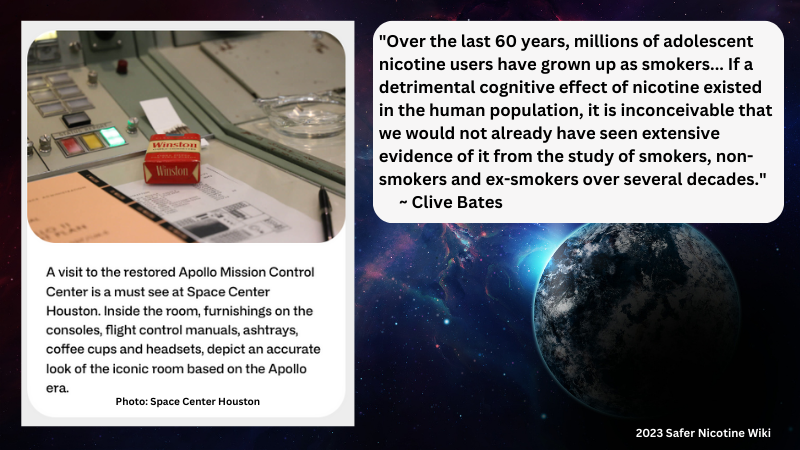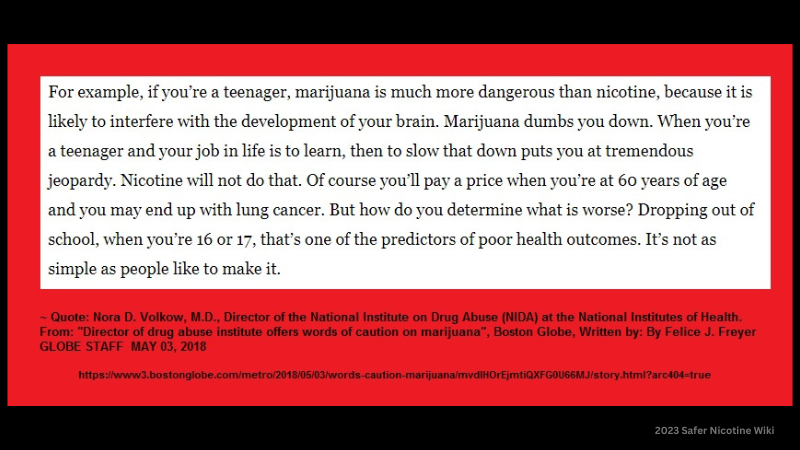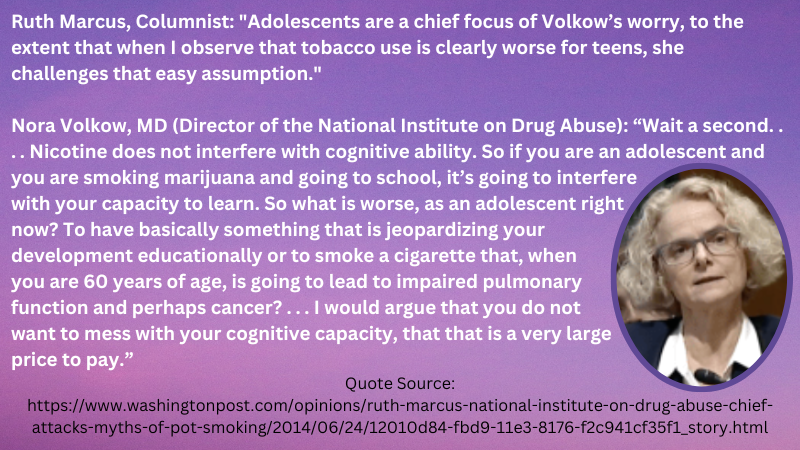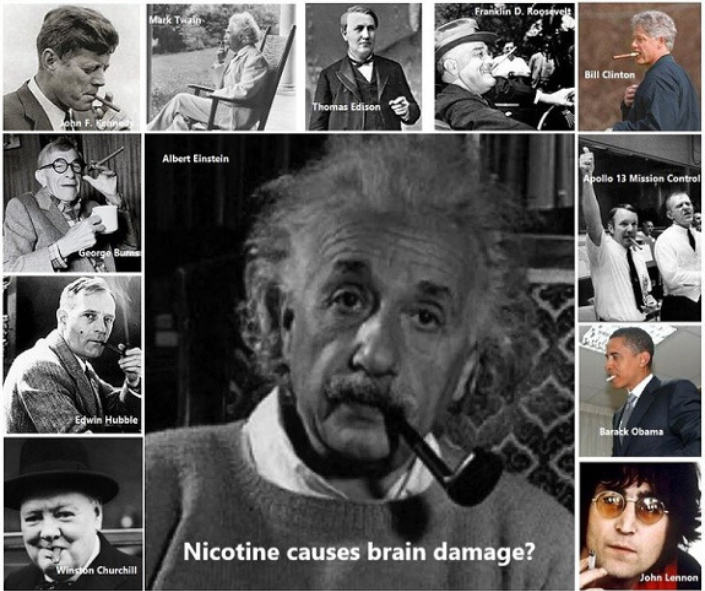Does nicotine damage the developing adolescent brain?

Scientific Publications - Youth - Cognition, Memory, and IQ
2021: Balancing Consideration of the Risks and Benefits of E-Cigarettes
- "Animal model studies have found that nicotine can affect maturation of brain parts associated with executive function and decision-making, potentially leading to more impulsive behavior, cognitive deficits, and greater likelihood to self-administer other drugs. In addition, there is evidence in humans of neurological changes attributed to nicotine in the brains of adolescent smokers, interpreted by some as reflecting similar harmful effects to those in the animal models."
- "These studies lead some researchers to suspect that adolescent nicotine use in any form may lead to long-term structural and functional brain changes with associated negative implications for cognition or impulse control. However, given species differences and questions about the relevance of experimental animal nicotine dosing paradigms to human use patterns, the validity of extrapolation to humans is speculative. Whether impaired brain development with behavioral consequences occurs in young nicotine consumers is difficult to determine because of potential confounding of genetic and socioeconomic factors, the influence of other substance abuse, and the role of preexisting neuropsychiatric problems associated with youth smoking. Research has yet to isolate nicotine use in the adolescent years and then examine later sequelae. Still, concerns about brain function effects of nicotine exposure through vaping deserve serious examination."
2015: Smoking During Adolescence as a Risk Factor for Attention Problems
- "Educational achievement did not differ within twin pairs discordant for smoking, in adults and adolescents."
2012: Smoking, childhood IQ and cognitive function in old age
- “Past smoking was not associated with significantly poorer performance than never smokers in any cognitive domain.”
2009: Associations between IQ and cigarette smoking among Swedish male twins
- “The [inverse] IQ–smoking association disappeared after adjustments for shared environment and genetics.”
2020: Dr. Brad Rodu
- Source: The CDC Nicotine Brain Fallacy / Bio
- "The harm in brain development federal officials talk non-stop about only happens in laboratory torture of mice. Mouse studies are well known to be of questionable value in predicting human effects. There is absolutely no scientific evidence to support the claim that nicotine causes harm to human brain development, so it is astounding that federal officials traffic in this false narrative. This nonsense is an affront to 34 million adult current smokers and 55 million former smokers in the U.S., virtually all of whom started when they were teenagers. There is no evidence that their brain development was harmed, a fact that was specifically acknowledged by a prestigious nicotine researcher Dr. Neal Benowitz at an international tobacco meeting this week."
2020: Clive Bates
- Nicotine science and policy Q & A
- No, this is a scare story and the claims do not bear scrutiny. Some public figures, including the US Surgeon General, have suggested that nicotine damages the adolescent brain. The evidence for this hypothesis comes only from a few rodent studies. These are an unreliable guide to human risk because the rodent brain does not offer a reliable proxy for the human brain and it is difficult to design experiments that are controlled to give a mouse equivalent exposure to a human.
- But this is not the main reason for doubt. Over the last 60 years, millions of adolescent nicotine users have grown up as smokers and either continue to use nicotine or have quit. The problem for the Surgeon General and others is that there is no sign of any cognitive impairment in the population of former teenage smokers and many of today’s finest adult minds were once young smokers. If a detrimental cognitive effect of nicotine existed in the human population, it is inconceivable that we would not already have seen extensive evidence of it from the study of smokers, non-smokers and ex-smokers over several decades."
2018: Nora Volkow MD (NIDA) comparing youth nicotine use with marijuana use
- Director of drug abuse institute offers words of caution on marijuana
- Freyer: "But isn’t marijuana much safer than the other legal drugs, alcohol and tobacco? Can you die from marijuana?"
- Volkow: "You can die from marijuana if you’re intoxicated and driving a car. I don’t know that it is safer. It depends on what stage in your life you are."
- "For example, if you’re a teenager, marijuana is much more dangerous than nicotine, because it is likely to interfere with the development of your brain. Marijuana dumbs you down. When you’re a teenager and your job in life is to learn, then to slow that down puts you at tremendous jeopardy. Nicotine will not do that. Of course you’ll pay a price when you’re at 60 years of age and you may end up with lung cancer. But how do you determine what is worse? Dropping out of school, when you’re 16 or 17, that’s one of the predictors of poor health outcomes. It’s not as simple as people like to make it."
2014: Nora Volkow MD (NIDA) comparing youth nicotine use with marijuana use
- The myths of smoking pot / Photo Source
- Marcus: "Adolescents are a chief focus of Volkow’s worry, to the extent that when I observe that tobacco use is clearly worse for teens, she challenges that easy assumption."
- Volkow: “Wait a second. . . . Nicotine does not interfere with cognitive ability. So if you are an adolescent and you are smoking marijuana and going to school, it’s going to interfere with your capacity to learn. So what is worse, as an adolescent right now? To have basically something that is jeopardizing your development educationally or to smoke a cigarette that, when you are 60 years of age, is going to lead to impaired pulmonary function and perhaps cancer? . . . I would argue that you do not want to mess with your cognitive capacity, that that is a very large price to pay.”
Rodent Studies vs. Human Studies
2019: Conserved cell types with divergent features in human versus mouse cortex
- Link to full paper
- "Our results demonstrate species divergence of gene expression between homologous cell types... these results help to resolve the paradox of failures in the use of mouse for preclinical studies ..."
2016: Why Journalists Should Stop Publishing Studies Conducted With Mice
- "When it comes to determining what will make humans healthy and disease-free, research involving mice has had remarkably few successes."
- "As soon as journalists see the word “mouse” in a study (or “rat,” “hamster,” etc.), they should put down the press release, delete any related emails, and refuse to write a word about that study. As a society, we waste billions of dollars and innumerable hours pursuing remedies and diets and exercise plans that may not even work in humans. The media bear a great deal of responsibility for this. To be fair, there have been many instances in which a reporter has pointed out that the study featured in his or her article was conducted on mice and may not be applicable to humans. But this is not nearly enough. When readers see a “breakthrough” treatment or diet plan advertised in the headline, they have already been misinformed — even if there is a modest disclaimer several paragraphs later."


